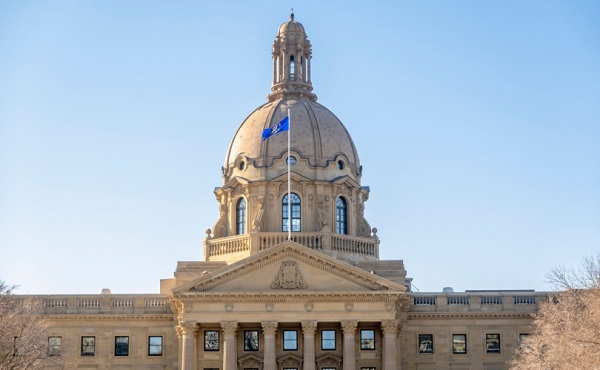Alberta
“Ontario Can’t do it Alone” – Fairness Alberta Expands with Eastern Canada Campaign

It has been just over four months since the launch of Fairness Alberta, a non-partisan Proudly Canadian, Fiercely Albertan organization, in May 2020. Fairness Alberta promotes education and discussion to combat biased government policies and regulations that restrict Alberta’s economic growth and prosperity. By highlighting Alberta’s $324 billion net contribution to the Canadian economy from 2000 to 2019, FA’s mandate is to “inform Canadians about the magnitude of the contributions Albertans make to Canada, while educating Canadian’s about the damaging fiscal, trade, energy, procurement, and infrastructure policies that chronically undermine Alberta’s – and Canada’s – potential.”

Dr. Bill Bewick, Director of Fairness Alberta
The public response to the organization throughout Alberta and across Canada has been overwhelmingly positive, according to Bill Bewick, Executive Director of Fairness Alberta. “Our factual approach is agreeable,” he says, “and even people who are skeptical of Alberta demanding more from the country are willing to listen and learn.”
On September 21, Fairness Alberta expanded into eastern Canada with the launch of their Fall 2020 Campaign in Ontario. The two-part billboard series in Toronto and Ottawa is designed to illustrate just how much Albertans have helped Ontarians carry the fiscal load in the federation over the last decade. “Many people are surprised by the fiscal contributions of each province given the size difference,” says Bewick, “people assume Ontario makes the biggest contribution, but that’s just not the case.”
From 2007-2018, Ontario contributed $98 billion net and Alberta contributed $240 billion net to the country, while the remainder of the provinces have received a combined total of $370 billion.
 As all Canadian provinces face the daunting road to recovery following the destructive economic impacts of COVID-19, the dissemination of accurate information regarding the crucial role of Alberta in the nation’s recovery remains crucial. Arguably even more so since the recent Throne Speech, delivered by Governor General Julie Payette on September 23, has been widely criticized for once again ignoring the contributions and needs of Albertans in favor of new policies that will further restrict productivity in Alberta by targeting natural gas.
As all Canadian provinces face the daunting road to recovery following the destructive economic impacts of COVID-19, the dissemination of accurate information regarding the crucial role of Alberta in the nation’s recovery remains crucial. Arguably even more so since the recent Throne Speech, delivered by Governor General Julie Payette on September 23, has been widely criticized for once again ignoring the contributions and needs of Albertans in favor of new policies that will further restrict productivity in Alberta by targeting natural gas.
Premiere Jason Kenney openly criticized the Throne Speech and the clean-fuel standard, stating, “We got a litany of policies that would strangle investment and jeopardize resource jobs when we most need the industry that generates 20 percent of government revenues in Canada” (1).
Fairness Alberta has responded similarly to developments from the recent Throne Speech, arguing that Alberta’s role in national recovery cannot be overstated or ignored. “Alberta is an engine in the fragile Canadian economy,” says Bewick, “If that productivity is hindered by the new clean fuel standards, no other province will be able to pick up the slack.”
The Ontario campaign is set to continue into the month of November, paired with online advertising that draws targeted audiences to their website, and the remainder of 2020 will see an expansion into British Columbia as Fairness Alberta continues to grow and fight for a fair deal for Alberta within Canada. Bewick believes that “there are millions of fair-minded Canadians out there and showing them the importance of Alberta’s economy is critical right now to ensure the federal government works with Alberta, not against it.”
For more information on Fairness Alberta, visit fairnessalberta.ca.
For more stories, visit Todayville Calgary.
Alberta
B.C. would benefit from new pipeline but bad policy stands in the way

From the Fraser Institute
By Julio Mejía and Elmira Aliakbari
Bill C-69 (a.k.a. the “no pipelines act”) has added massive uncertainty to the project approval process, requiring proponents to meet vague criteria that go far beyond any sensible environmental concerns—for example, assessing any project’s impact on the “intersection of sex and gender with other identity factors.”
In case you haven’t heard, the Alberta government plans to submit a proposal to the federal government to build an oil pipeline from Alberta to British Columbia’s north coast.
But B.C. Premier Eby dismissed the idea, calling it a project imported from U.S. politics and pursued “at the expense of British Columbia and Canada’s economy.” He’s simply wrong. A new pipeline wouldn’t come at the expense of B.C. or Canada’s economy—it would strengthen both. In fact, particularly during the age of Trump, provinces should seek greater cooperation and avoid erecting policy barriers that discourage private investment and restrict trade and market access.
The United States remains the main destination for Canada’s leading exports, oil and natural gas. In 2024, nearly 96 per cent of oil exports and virtually all natural gas exports went to our southern neighbour. In light of President Trump’s tariffs on Canadian energy and other goods, it’s long past time to diversify our trade and find new export markets.
Given that most of Canada’s oil and gas is landlocked in the Prairies, pipelines to coastal terminals are the only realistic way to reach overseas markets. After the completion of the Trans Mountain Pipeline Expansion (TMX) project in May 2024, which transports crude oil from Alberta to B.C. and opened access to Asian markets, exports to non-U.S. destinations increased by almost 60 per cent. This new global reach strengthens Canada’s leverage in trade negotiations with Washington, as it enables Canada to sell its energy to markets beyond the U.S.
Yet trade is just one piece of the broader economic impact. In its first year of operation, the TMX expansion generated $13.6 billion in additional revenue for the economy, including $2.0 billion in extra tax revenues for the federal government. By 2043, TMX operations will contribute a projected $9.2 billion to Canada’s economic output, $3.7 billion in wages, and support the equivalent of more than 36,000 fulltime jobs. And B.C. stands to gain the most, with $4.3 billion added to its economic output, nearly $1 billion in wages, and close to 9,000 new jobs. With all due respect to Premier Eby, this is good news for B.C. workers and the provincial economy.
In contrast, cancelling pipelines has come at a real cost to B.C. and Canada’s economy. When the Trudeau government scrapped the already-approved Northern Gateway project, Canada lost an opportunity to increase the volume of oil transported from Alberta to B.C. and diversify its trading partners. Meanwhile, according to the Canadian Energy Centre, B.C. lost out on nearly 8,000 jobs a year (or 224,344 jobs in 29 years) and more than $11 billion in provincial revenues from 2019 to 2048 (inflation-adjusted).
Now, with the TMX set to reach full capacity by 2027/28, and Premier Eby opposing Alberta’s pipeline proposal, Canada may miss its chance to export more to global markets amid rising oil demand. And Canadians recognize this opportunity—a recent poll shows that a majority of Canadians (including 56 per cent of British Columbians) support a new oil pipeline from Alberta to B.C.
But, as others have asked, if the economic case is so strong, why has no private company stepped up to build or finance a new pipeline?
Two words—bad policy.
At the federal level, Bill C-48 effectively bans large oil tankers from loading or unloading at ports along B.C.’s northern coast, undermining the case for any new private-sector pipeline. Meanwhile, Bill C-69 (a.k.a. the “no pipelines act”) has added massive uncertainty to the project approval process, requiring proponents to meet vague criteria that go far beyond any sensible environmental concerns—for example, assessing any project’s impact on the “intersection of sex and gender with other identity factors.” And the federal cap on greenhouse gas (GHG) emissions exclusively for the oil and gas sector will inevitably force a reduction in oil and gas production, again making energy projects including pipelines less attractive to investors.
Clearly, policymakers in Canada should help diversify trade, boost economic growth and promote widespread prosperity in B.C., Alberta and beyond. To achieve this goal, they should put politics aside, focus of the benefits to their constituents, and craft regulations that more thoughtfully balance environmental concerns with the need for investment and economic growth.
Alberta
Alberta introduces bill allowing province to reject international agreements

From LifeSiteNews
Under the proposed law, international treaties or accords signed by the federal government would not apply in Alberta unless approved through its own legislation.
Alberta’s Conservative government introduced a new law to protect “constitutional rights” that would allow it to essentially ignore International Agreements, including those by the World Health Organization (WHO), signed by the federal Liberal government.
The new law, Bill 1, titled International Agreements Act and introduced Thursday, according to the government, “draws a clear line: international agreements that touch on provincial areas of jurisdiction must be debated and passed into law in Alberta.”
Should the law pass, which is all but certain as Alberta Premier Danielle Smith’s Conservatives hold a majority government, it would mean that any international treaties or accords signed by the federal government would not apply in Alberta unless approved through its own legislation.
“As we return to the legislature, our government is focused on delivering on the mandate Albertans gave us in 2023 to stand up for this province, protect our freedoms and chart our path forward,” Smith said.
“We will defend our constitutional rights, protect our province’s interests and make sure decisions that affect Albertans are made by Albertans. The federal government stands at a crossroads. Work with us, and we’ll get things done. Overstep, and Alberta will stand its ground.”
According to the Alberta government, while the feds have the “power to enter into international agreements on behalf of Canada,” it “does not” have the “legal authority to impose its terms on provinces.”
“The International Agreements Act reinforces that principle, ensuring Alberta is not bound by obligations negotiated in Ottawa that do not align with provincial priorities,” the province said.
The new Alberta law is not without precedent. In 2000, the province of Quebec passed a similar law, allowing it to ignore international agreements unless approved by local legislators.
The Smith government did not say which current federal agreements it would ignore, but in theory, it could apply to any agreement Canada has signed with the United Nations or the WHO.
-

 Alberta2 days ago
Alberta2 days agoB.C. would benefit from new pipeline but bad policy stands in the way
-

 Energy1 day ago
Energy1 day agoCAPP calls on federal government to reset energy policy before it’s too late
-

 Economy2 days ago
Economy2 days agoTop Scientists Deliberately Misrepresented Sea Level Rise For Years
-

 Business1 day ago
Business1 day agoTrump Raises US Tariffs on Canadian Products by 10% after Doug Ford’s $75,000,000 Ad Campaign
-

 Frontier Centre for Public Policy2 days ago
Frontier Centre for Public Policy2 days agoChurches Are All That Stands Between Canada And Tyranny
-

 Alberta2 days ago
Alberta2 days agoAlberta introduces bill allowing province to reject international agreements
-

 Business1 day ago
Business1 day agoCanada is still paying the price for Trudeau’s fiscal delusions
-

 Business1 day ago
Business1 day agoTrans Mountain executive says it’s time to fix the system, expand access, and think like a nation builder











